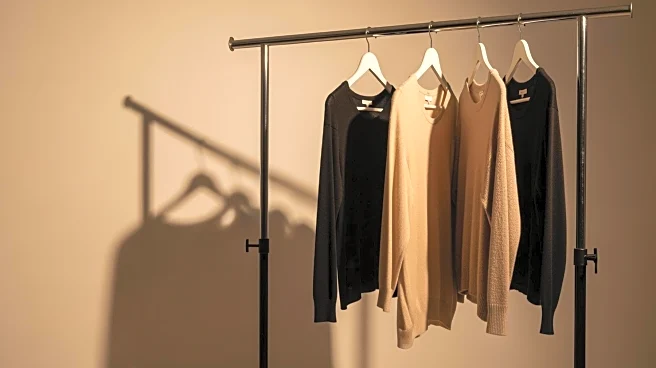What's Happening?
The clothing rental industry is experiencing significant growth as more consumers seek budget-friendly alternatives amid rising apparel prices. Lydia Patel, a pharmacist and YouTube creator from Minnesota, has embraced clothing rental services like Rent
the Runway and Nuuly to access quality fashion without the need for permanent ownership. This industry, valued at $2.6 billion, is projected to more than double by 2035, driven by inflation and tariffs that are increasing clothing costs. Apparel prices have risen 9% since February 2020, with jackets and outerwear seeing a 24% increase over the past year. Rental platforms offer consumers the ability to refresh their wardrobes without the financial burden of purchasing new clothes, appealing to those affected by the economic pressures.
Why It's Important?
The expansion of clothing rental services highlights a shift in consumer behavior towards sustainable and cost-effective fashion solutions. As tariffs and inflation continue to impact apparel prices, rental platforms provide an alternative that mitigates the financial strain on consumers. This trend could influence the broader retail industry, encouraging brands to explore rental models or partnerships to maintain competitiveness. The growth of this sector also reflects changing attitudes towards ownership and sustainability, potentially leading to long-term shifts in fashion consumption patterns.
What's Next?
As the holiday season approaches, demand for rental fashion is expected to increase, with consumers seeking special outfits for events. Companies like Rent the Runway and Nuuly are preparing by expanding their inventory to meet customer needs. However, the industry faces challenges from tariffs, which may lead to shipment delays and reduced stock availability. Rental platforms must navigate these obstacles while maintaining customer satisfaction and subscription levels. The ongoing economic pressures may further drive consumers towards rental and secondhand markets, influencing future retail strategies.
Beyond the Headlines
The rise of clothing rental services underscores broader cultural shifts towards minimalism and sustainability. As consumers prioritize experiences over ownership, rental platforms offer a solution that aligns with these values. This trend may encourage fashion brands to adopt more sustainable practices and explore innovative business models. Additionally, the rental industry's growth could impact traditional retail, prompting a reevaluation of production and distribution strategies to accommodate changing consumer preferences.
















